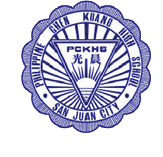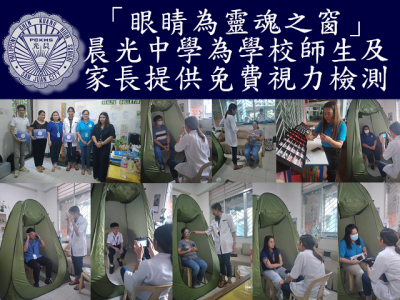Children’s visual development generally completes around the age of eight. If there are abnormalities in vision during this developmental period and they are not corrected, visual development may be impaired. In daily life, parents or caregivers may find it difficult to detect children’s vision problems. Through vision screening, we can identify children with visual abnormalities early, arrange referrals and treatment to help with their future vision and visual development.
Our school’s health office invites Dr. CELYN L. ARTIEDA, an eye specialist, to provide vision tests for our students on November 7th from 10:00 AM to 4:00 PM. We will also provide eyeglasses to students from financially disadvantaged backgrounds. Furthermore, free vision tests will be offered to teachers and parents in both Chinese and English.
Dr. ARTIEDA will also share some eye care tips with the students and parents who undergo vision tests, such as (1) getting enough sleep, having a balanced diet, and engaging in outdoor activities daily, (2) reading and working in well-lit environments, (3) maintaining a minimum distance of 30 cm between books and eyes while reading, (4) limiting the use of electronic screen products; children aged 2 to 5 should not use them for more than 1 hour per day, and parents should supervise usage, (5) maintaining a minimum distance of 50 cm from the eyes to computer screens, 40 cm to tablet screens, and 30 cm to smartphones when using screen products; for watching TV, the farther the better, (6) taking breaks of 20 to 30 seconds after reading, watching TV, or using screen products for 20 to 30 minutes, looking into the distance to relax the eye muscles, (7) wearing protective eyewear when engaging in ball sports, and (8) seeking advice from doctors or optometrists if there are problems with the eyes or vision.
Our school’s educational philosophy is to cultivate a healthy lifestyle to promote students’ growth. The school strongly supports the ‘Healthy School’ policy, which can enhance learning experiences and assist students in developing healthy and balanced habits, including maintaining a regular daily routine, engaging in moderate physical activity, having a balanced diet, learning self-care, maintaining personal hygiene, and ensuring mental well-being.”
兒童的視覺發展大概於八歲時完成發育。假如視力在這發育期間出現異常,而未能矯正,視覺發展或會受損。在日常生活上,家長或照顧者較難察覺孩子的視力問題。透過視力普查,可及早發現視力異常的兒童,以便安排轉介及治療,有助他們將來的視力及視覺發展。本校醫務室於十一月七日上午十時至下午四時,邀請到眼科專長CELYN L. ARTIEDA醫師,為本校學生提供視力檢測,並贈送家境拮据的學生們眼鏡。不僅如此,也提供中英文老師和家長們免費視力檢測。 ARTIEDA醫師也為接受視力檢測的學生及家長們分享了一些護眼小技巧,如要(一)有充足睡眠、均衡飲食及每天做適量戶外運動。(二)在光線充足環境下閱讀及工作。(三)閱讀時,書本與眼睛最少要距離30厘米。(四)限制使用電子屏幕產品;2至5歲的孩子每天不應多於1小時,使用時家長亦要在旁指導。(五)使 用 屏 幕 產 品,眼 睛 與 電 腦 屏 幕 保 持 最 少 50 厘 米 距 離 , 與 平 板 電 腦 保 持 最 少 40 厘 米 距 離 , 而 與 智 能 電 話 保 持 最 少 30 厘 米 距 離 。看電視時,距離熒幕越遠越好。(六)閱讀、看電視或使用屏 幕 產 品 20 至 30 分 鐘 , 應 小 休 20 至 30 秒 ,遠望景物,讓眼內肌肉放鬆。(七)進行球類運動時,應佩戴保護眼罩。(八 )若眼睛或視力有毛病,應請教醫生或視光師等。 本校的辦學宗為培養健康的生活方式以促進學生成長-學校普遍積極支持「健康校園」政策,可加強有關學習經歷,致力協助學生養成健康和均衡的生活習慣,包括作息有序、適量運動、均衡飲食、學會自理、保持個人衞生及心理健康等等。


